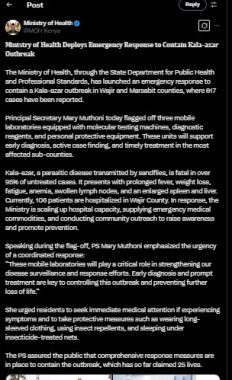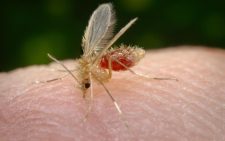Govt deploys emergency response after Kala-azar outbreak cases cross 600

The national government, through the Ministry of Health (MOH), has deployed emergency measures to contain the Kala-azar outbreak.
In a statement on Friday, March 28, 2025, the Ministry of Health noted that the emergency response targets Wajir and Marsabit counties, where 617 cases have been reported.
As part of the intervention plan, the Public Health and Professional Standards Principal Secretary, Mary Muthoni, flagged off three mobile laboratories equipped with molecular testing machines, diagnostic reagents, and personal protective equipment.
“These units will support early diagnosis, active case finding, and timely treatment in the most affected sub-counties,” a statement shared by the Ministry of Health read in part.

Speaking during the flag-off, PS Mary Muthoni emphasized the urgency of a coordinated response.
“These mobile laboratories will play a critical role in strengthening our disease surveillance and response efforts. Early diagnosis and prompt treatment are key to controlling this outbreak and preventing further loss of life.”
She urged residents to seek immediate medical attention if experiencing symptoms and to take protective measures such as wearing long-sleeved clothing, using insect repellents, and sleeping under insecticide-treated nets.
The PS assured the public that comprehensive response measures were in place to contain the outbreak, which has so far claimed 25 lives.

What is Kala-azar
Kala-azar also known as visceral leishmaniasis, a parasitic disease transmitted by sandflies, is fatal in over 95 per cent of untreated cases.
The parasite primarily infects the reticuloendothelial system and may be found in abundance in bone marrow, spleen and liver.
It presents with prolonged fever, weight loss, fatigue, anemia, swollen lymph nodes, and an enlarged spleen and liver.
Currently, 106 patients are hospitalized in Wajir County. In response, the ministry is scaling up hospital capacity, supplying emergency medical commodities, and conducting community outreach to raise awareness and promote prevention.














